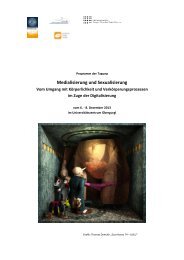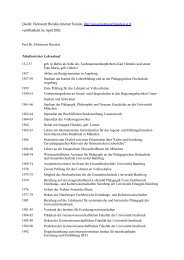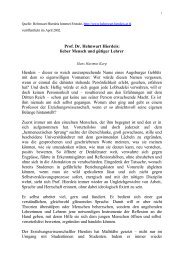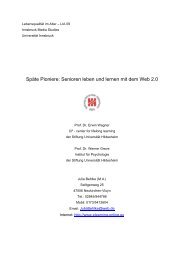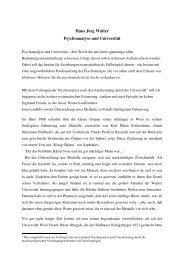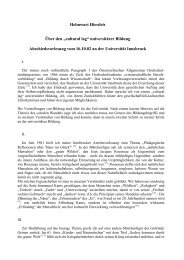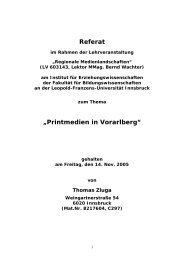Download pdf - Universität Innsbruck
Download pdf - Universität Innsbruck
Download pdf - Universität Innsbruck
Sie wollen auch ein ePaper? Erhöhen Sie die Reichweite Ihrer Titel.
YUMPU macht aus Druck-PDFs automatisch weboptimierte ePaper, die Google liebt.
Some of the social logics of sharing<br />
Nicholas A. John<br />
Abstract<br />
This paper is about sharing—the word, the act, its rhetoric, its ideologies and its logics. More specifically,<br />
it is about sharing in three different but interrelated contexts: Web 2.0, “sharing economies,”<br />
and intimate interpersonal relationships. The starting point of this paper is Web 2.0 in general,<br />
and especially social network sites (SNSs). In particular, the following is the outcome of an<br />
observation not yet systematically documented by the research literature, namely, that the constitutive<br />
activity of Web 2.0 is sharing (but see Stalder & Sützl, 2011; Wittel, 2011). This observation<br />
gives rise to the following questions: What does sharing mean in the context of Web 2.0 and<br />
SNSs? Are there other instances where sharing is a key central concept? And if so, how might<br />
they be related?<br />
The following, which is based on an emic approach to sharing, is exploratory in nature, yet it rests<br />
on a clear argument, specifically, that in order to gain a deeper understanding of sharing in Web<br />
2.0 we need to include other instances of cultural practices that are called sharing as well. Accordingly,<br />
in addition to SNSs, this paper discusses economies of sharing and the centrality of<br />
sharing our emotions in the management of our intimate relationships. The outcome of such an<br />
analysis is, I believe, greater than the sum of its constituent parts. This paper, therefore, represents<br />
the first attempt at outlining the interrelations between these spheres of sharing.<br />
1. Meanings of sharing<br />
The Oxford English Dictionary teaches us that in the sixteenth century, the verb “to share”<br />
meant “to cut into parts” or “to divide.” A ploughshare, therefore, which is the cutting<br />
edge of the plough, is so called because it shares, or splits, the earth. Likewise, when a<br />
child shares their chocolate bar they divide it: they break it up into shares. In this sense,<br />
the act of sharing is one of distribution and it is an active practice. Importantly, it is also a<br />
zero-sum game—when I give you some of my candy, I am left with less. Sharing as distribution<br />
is, of course, governed by cultural norms. These norms, for instance, are the subject<br />
of Katriel’s rich description of ritualized sharing and exchange among children (Katriel,<br />
1987, 1988), as well as constituting one of the main focuses of the early anthropology of<br />
hunter-gatherer societies. From these studies it is clear that sharing is constitutive of social<br />
relations.<br />
Another meaning of sharing is to have something in common with someone, where this<br />
thing may be concrete or abstract. For instance, when students share a dorm room, the<br />
room is both of theirs, and the dorm room itself remains whole, despite being shared. This<br />
logic also applies to abstract shared objects which cannot be owned, such as interests, fate,<br />
beliefs, or culture. Here too sharing is about distribution, but in an abstract and passive<br />
way, and in a way that is not a zero-sum game.



